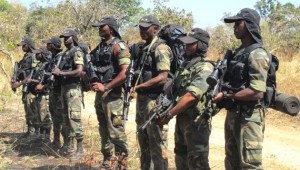A Welcomed Victory against Boko Haram, with Chad’s Help
 After immense criticism of the Nigerian military and their handling of Boko Haram, Chad recently dispatched its own troops to Cameroon to join the battle. This included close to 2000 Chadian troops, backed by armoured vehicles sent into the region of Gamboru on the outskirts of Cameroon to join the effort to combat Boko Haram.
After immense criticism of the Nigerian military and their handling of Boko Haram, Chad recently dispatched its own troops to Cameroon to join the battle. This included close to 2000 Chadian troops, backed by armoured vehicles sent into the region of Gamboru on the outskirts of Cameroon to join the effort to combat Boko Haram.
After this military operation, The Chadian Army has reported killing over 200 Boko Haram militants and regaining a significant portion of the Gamboru territory which, much like its neighboring town of Chibok, was occupied by Boko Haram fighters. Chibok is the town where a little under a year ago, Boko Haram gained international notoriety for capturing almost 200 school girls in the middle of the night, many of which have yet to be returned to their families.
Since the incident last year , the region surrounding Chibok has weathered further attacks: the militant group continued to terrorize residents on a consistent basis, all the while withstanding attempts by the Nigerian military to fully regain control of the territory until November of last year.
As military operations go, this has been one of the more successful joint efforts between Nigerian and Chadian troops, resulting in only nine fatalities on the Chadian side. Intel leading up to the battle indicated that Boko Haram fighters were taking refuge is a the surrounding Sambisa Forest (also where the school girls were reported taken). Despite highest hopes, there was no real evidence of the girls in this region, especially after Boko Haram’s leader Abubakar Shekau announced , “the girls have long been married off.” Therefore, Chadian troops could not harm the girls by fighting in the forest and had no expectations to recover them there.
The death of these 200 Boko Haram militants in the fight is likely the closest form of retribution that the parents of the 200 young girls have gotten to date. More significantly, this victory represented a reassuring sign for many of the local communities.
For months, it seemed that Boko Haram had been advancing through northern Nigeria unbridled as the Nigerian Military kept suffering blow after blow. Due to the relative success of this operation and the offensive’s successful cooperation between Chadian and Nigerian troops, things seem to be looking up for local communities, for Nigeria, and now, for the region’s ongoing struggle with insurgency.
Casualties were low for the Chadian Army, but it is nonetheless crucial to note that while fleeing from the Nigerian and Chadian troops, Boko Haram militants killed as many as 30 people on their way back to one of their safe grounds in Northern Cameroon (Fotokol).
Despite the definite positive contribution of the Chadian and Nigerian armies, some local reports also indicate the possibility of a third party involved in the altercation. According to reports given to the Agence France-Press in November of 2014 when the Nigerian Military recaptured Chibok, the national armies had a great deal of help from a Civilian Joint Task Force. According to testimonies from people within the town, like Pogu Bitrus, the Civilian Task Force actually took on most of the fight against Boko Haram inside the town, while the Nigerian military stood ground on the outskirts to keep any militants from fleeing from the inside or joining the fight from the outside.
Because this recent fighting took place in this same region, there is reason to believe that the Nigerian and Chadian forces received some form of assistance from this resilient local entity or other local residents more familiar with the surrounding terrains and dense forest. No matter the case, this victory represents a positive sign in an enduring conflict facing the regional population long grown tired with their military’s incompetence. If this battle is an indication of more to come, the region can find great hope in their countries’ militaries once again.
